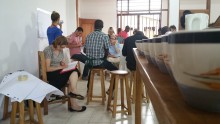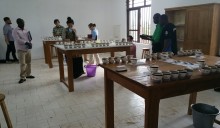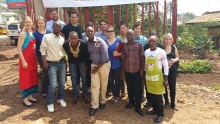Coffee Quality Manager Beth Ann Caspersen recently traveled to the Democratic Republic of the Congo to judge the country's first-ever coffee cupping competition. This is the seventh blog post in the series about the visit. Read part one here.
Competition Day

Many of the judges had heard about all of our trials and tribulations to set up the competition. I didn’t know many of them, but hugged each one as they walked in, and thanked them for participating in this historic event. Luckily, this was a professional, but flexible, group of people; they knew that a cupping completion in the DRC would not be easy and they all just seemed happy to be there!
We were off to a smooth start: the power was working, the cupping tables were set, the forms were printed, the water was boiled. After briefly reviewing the cupping protocols, we divided into groups and started our sensorial evaluation of the first round of six coffees. The process for cupping takes about 45 minutes and all of the grading of the coffees is done in silence. Each coffee is described and given a quality rating for 10 different categories and is then tallied. Next coffees are discussed as a group - one by one and each judge reveals the score they gave the coffee. We had a great panel of judges from the U.S., Rwanda and the Congo (including Moses).

The panel of judges finished the final round and then my friend and colleague Katherine Nolte of Twin Trading went to work to input the data and calculated the top six coffees. After entering data, she asked me to come and see the results and we discovered that one of the coffees was within 1/1000 of a point from making it into the final round, so we looked at each other and agreed to include the coffee in the final round. It was the right thing to do.
Moses and I then spent the evening roasting the coffees for the cupping the next morning. I knew what the top seven coffees were and I coded all of them. What Moses did not know, was that his co-op, SOPACDI, was part of the final round! We roasted into the evening and got ready for the finals.
The Final Day and the Final Round
The best coffees that the DRC had to offer in this competition were prepped and the whole cupping panel seemed to be bursting with excitement. We walked around our tables to smell the dry fragrance of each of the coffees and wrote down our secret scores. It all seemed to be flowing well, until I found out that the electricity did not work. Surprise, surprise.

In the process, we caught an outlet on fire and a series of small disagreements seemed to infiltrate the goodwill we previously had going. So, I took charge. It was the first time throughout the week that I got mad. I was mad that the electricity in our building didn’t work and that we couldn’t even pay to have it turned on. I was mad for the poor infrastructure and even more mad that Congolese people have to deal with nonsense like this every day. So what did we do? We located two additional outlets in the World Food Program building, boiled the water and then a team of six people ran the water kettles back to the lab. We were going to cup all of these coffees and give them the proper recognition they deserved through a fair and well-run cupping competition. In my mind, there was no other option.
After a sweaty and frustrating start, all of the coffees were finally cupped and graded. Our group awarded wonderful scores to great coffees, some exceeding 90 points with amazing tropical fruit flavors, sparkling acidity, and so much more. I am also pleased to report that SOPACDI tied for 3rd place and received high scores for their delicious coffee. Moses was so proud!
This was one of the most professionally challenging and satisfying projects I have ever been involved with, and I am so happy to have been a part of it. When we handed out awards later that day, I was overwhelmed with emotion and thrilled to watch the look on all of the farmers’ faces during the awards ceremony.
Saveur du Kivu was a multi-layered event that started with Run Across Congo, included amazing music performances by local Congolese artists, and culminated with the cupping competition. There were so many amazing connections made throughout the process and it laid the foundation for great things to come. I believe that it was really the start of something big; opening up the coffee industry to a world of possibility and a reinvigorated sector that deserves to be recognized as one of the most amazing coffee origins on the planet.
If there is a competition again next year in DRC, sign me up. I can’t wait to see what happens next.
